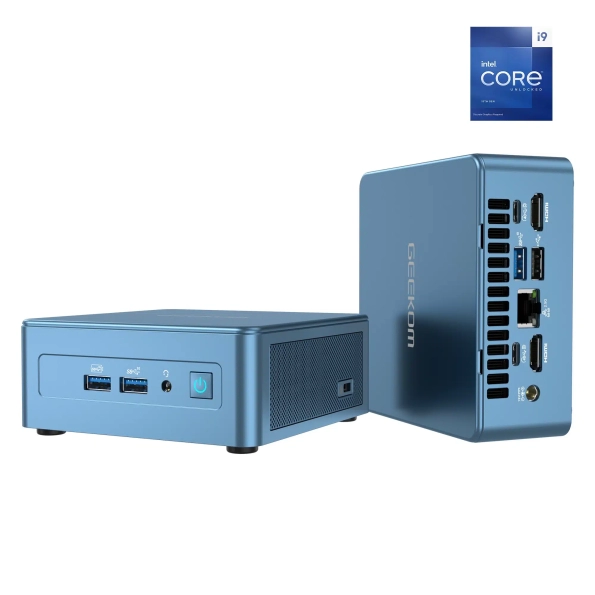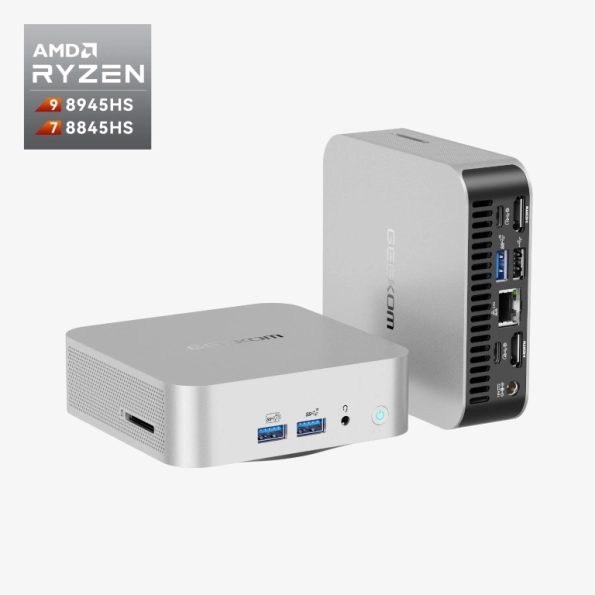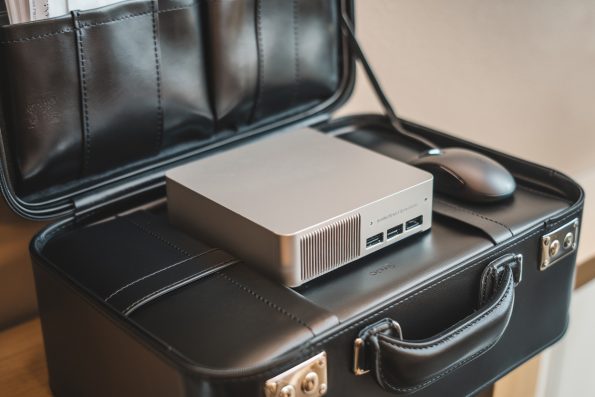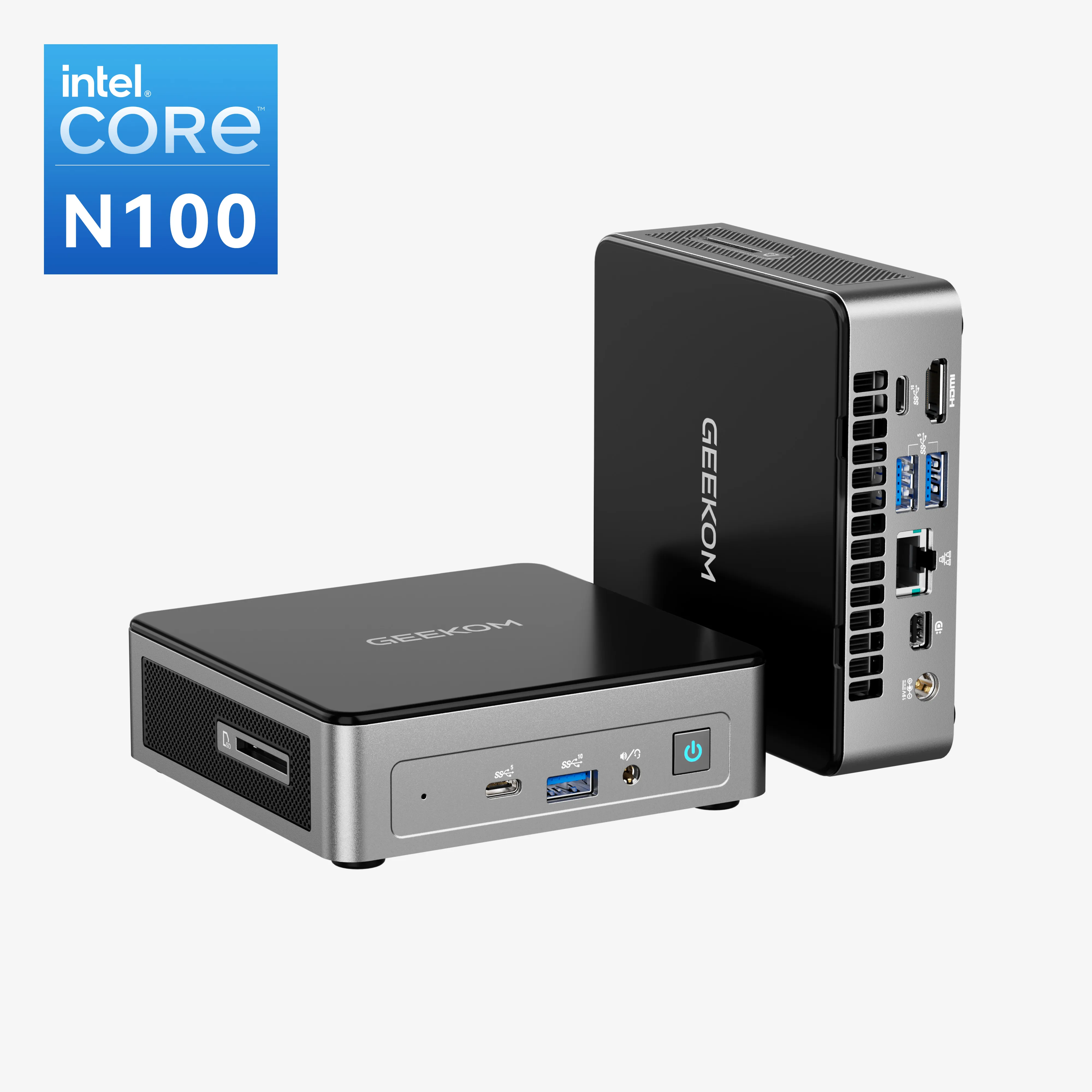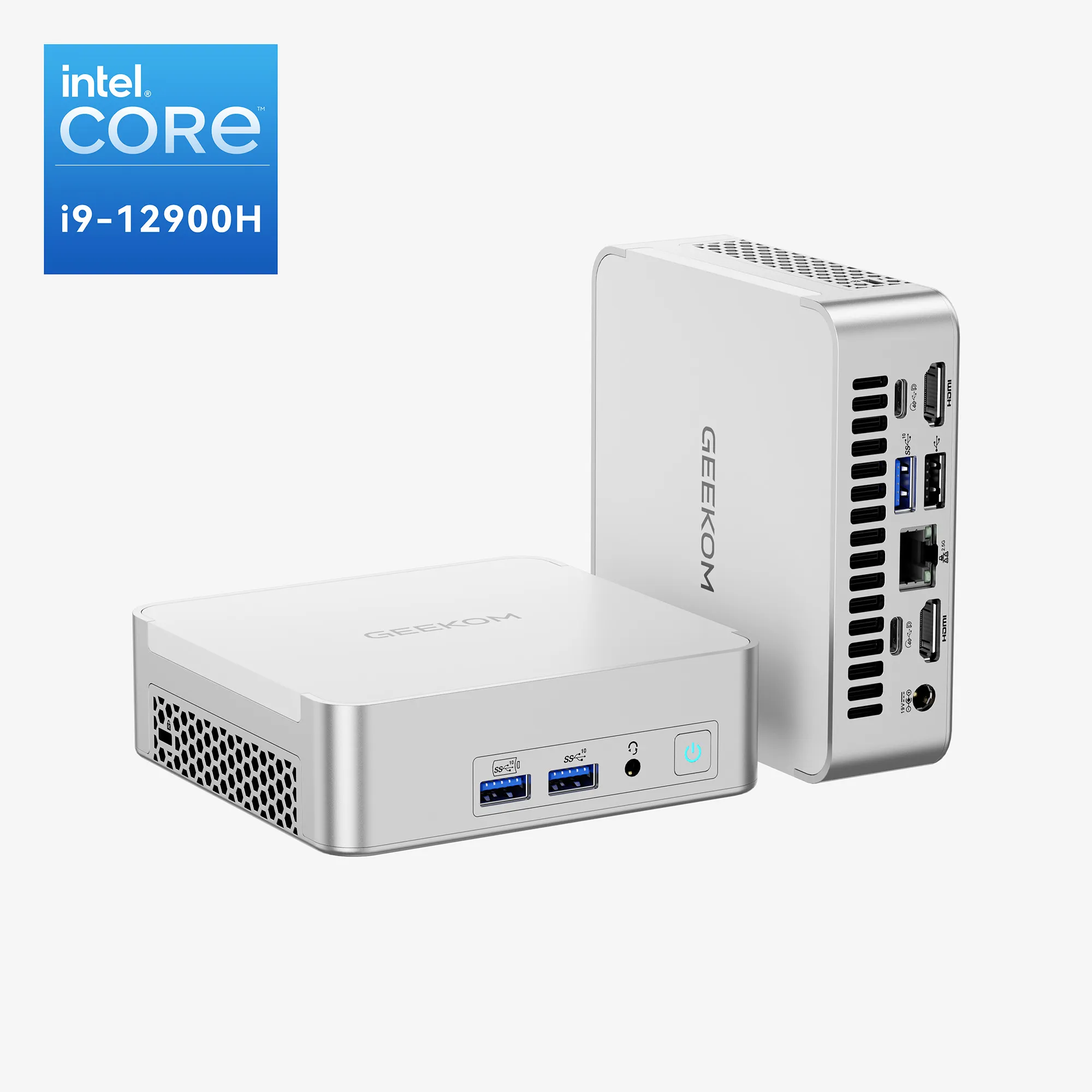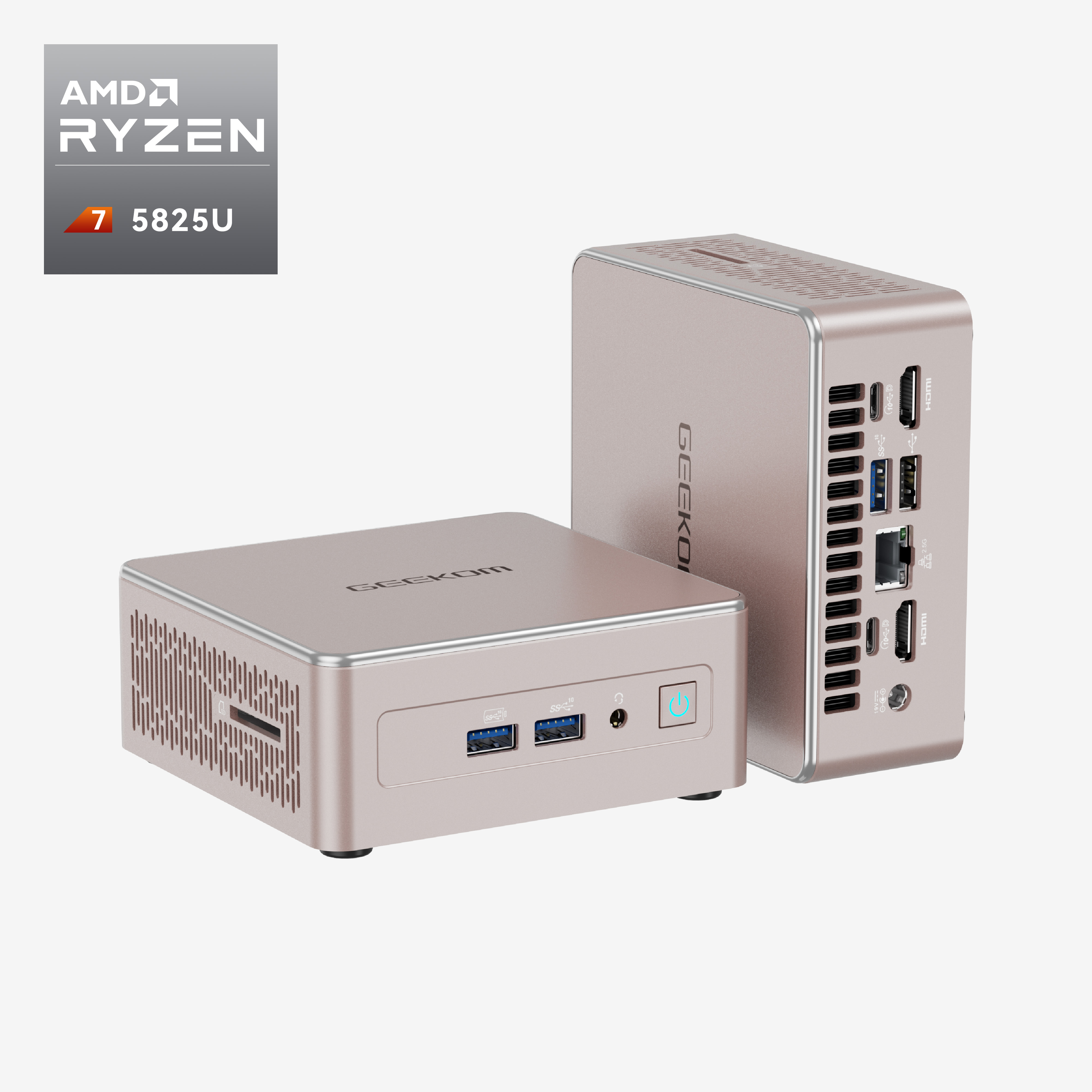One of the main requirements in the IT sector today is the need for devices with exponentially growing performance. This means providing businesses and professionals in this field with solutions that are increasingly efficient from a technological perspective. In the current social context, remote work has grown exponentially, which creates a demand for devices with high performance in a compact size. This is necessary for both logistical and functional reasons. Mini PCs with powerful CPUs address this need by combining a small, compact format with significant power.
These devices are specifically designed to fit into tight spaces while still being capable of handling complex tasks. Nowadays, a Mini PC can match the power of a traditional desktop computer. Additionally, they offer the convenience of portability. For all these reasons, Mini PCs are an ideal choice for IT professionals, from freelancers to small businesses, and for all situations that require a small yet powerful solution.
Let’s explore the advantages of choosing a Mini PC, especially in the IT sector, and what to consider when making a choice.
What Are the Advantages of Choosing Mini PCs with Powerful CPUs for the IT Sector?
We’ve already highlighted how Mini PCs with powerful CPUs can be a useful choice for the IT sector due to their high performance combined with compact dimensions. But what specific advantages make them worth choosing?
- Compact size. One of the main features of Mini PCs is their small size, which allows them to fit into tight spaces or limited work environments. Additionally, they are easy to transport. This means you can work even in environments where larger devices are not feasible.
- Versatility. Another key aspect is versatility. In the IT sector, a Mini PC can function as a backup server or a workstation for developing software or industrial applications. This demonstrates how their power is inversely proportional to their size.
- Easy maintenance. When we talk about ease of maintenance, we refer to how simple it is to upgrade or perform maintenance without being an expert. For example, you can easily upgrade components like RAM or graphics cards, ensuring that your Mini PC can support new software or even outperform its original specifications.
- Low energy consumption. In today’s world, where energy costs have a significant impact on any activity, Mini PCs’ lower energy consumption compared to traditional desktops is a major advantage. This makes them an ideal choice for freelancers looking to save on expenses or IT companies aiming to reduce operational costs.
- Reduced management costs. Beyond energy savings, Mini PCs also require less maintenance and tend to have a longer lifespan than larger computers. This has a positive impact on the Total Cost of Ownership (TCO) for businesses.
- Workflow optimization. Finally, the efficiency of modern CPUs ensures smooth and fast performance. This translates to reduced work times, which is essential for professionals in the IT sector.
The Heart of Performance: The CPU
The beating heart of a Mini PC is its CPU, which stands for Central Processing Unit. This component is responsible for executing all operations and processes, making its selection critical for achieving high performance. This is especially important in the IT sector, where speed and efficiency are paramount. Let’s look at the key factors to consider when choosing a CPU.
Number of Cores and Threads
A core is an independent processing unit that allows the CPU to perform multiple tasks simultaneously. This is particularly important when working with resource-intensive applications, such as virtualization, data analysis, or rendering. Threads, on the other hand, are processes that a core manages within its multitasking capabilities. A higher number of threads means better multitasking performance.
Clock Speed
Another important factor to consider in a CPU is its clock speed. This indicates the number of operations the CPU can perform per second, measured in GHz. Higher clock speeds result in faster response times and smoother operations, which is essential for tasks requiring intensive calculations.
Turbo Boost
Another feature to evaluate is Turbo Boost. This CPU technology allows for an increase in clock speed to handle heavier workloads more efficiently.
Energy Efficiency
Modern CPUs deliver high performance while also reducing energy consumption, which is a crucial factor for Mini PCs.
Cache
The CPU cache is another important consideration. It refers to the memory that allows quick access to frequently used data, improving overall performance. A good Mini PC should strike the right balance between all these characteristics to meet the challenges typically faced in the IT sector.
Additional Hardware Elements to Consider When Choosing a Mini PC
When selecting a Mini PC, it’s important to consider hardware elements that ensure performance suited to your needs. These characteristics should also align with your available budget. Key technical elements to evaluate include:
- RAM: This directly affects the Mini PC’s ability to handle multiple applications. For basic needs like browsing or streaming, 8 GB of RAM may suffice. However, in the IT sector, where demands are more complex, starting with 16 GB or more is essential.
- Graphics card: This is especially important for those using advanced graphics or rendering software. It’s advisable to choose a Mini PC with a dedicated graphics card, such as NVIDIA or AMD, which belong to the mid-to-high-end range.
- Connectivity: This is a fundamental aspect of the IT sector, particularly for remote work. Ensure the Mini PC includes USB-C, HDMI, Ethernet ports, and SD card slots. For IT professionals, having Wi-Fi 6 and Bluetooth 5.2 is crucial for greater stability and speed—two essential elements for this field.
Which Mini PC to Choose? A Comparison of Three Models
The GEEKOM MINI IT13 features an Intel Core i9-13900H or i7-13620H processor, and its DDR4-3200 RAM can be expanded up to 64 GB. It comes with Windows 11 Pro pre-installed, making it ready to use right out of the box. Thanks to its technical specifications, it is well-suited for the IT sector, offering a good balance between performance and budget.
- 13th Gen Intel® Core™ i9-13900H , Core i7-13620H
- Intel® Iris® Xe Graphics for i9, Intel® UHD Graphics for i7
- Dual-channel DDR4-3200MT/s, up to 64 GB
- M.2 2280 PCIe Gen 4 x 4 SSD, up to 2TB
- Wi-Fi 6E and Bluetooth® 5.2
- Support Quad Display
If budget is the most important factor, the GEEKOM A8 is a solid choice. It is equipped with AMD Ryzen 9 8945HS or Ryzen 7 8845HS processors, dual-channel DDR4 RAM, and comes with Windows 11 Pro pre-installed. While it is more suitable for moderate or less demanding tasks compared to the two models mentioned above, it is a more economical option. As always, the choice ultimately depends on individual needs and priorities.
- AI Ready: Powerful Mini PC with AI Smarts
- AMD Ryzen™ 9 8945HS or Ryzen™ 7 8845HS
- AMD Radeon™ 780M graphics
- Dual-channel DDR5 5600MT/s, up to 64 GB
- M.2 2280 PCIe Gen 4.0 x 4 SSD, up to 2TB
- Wi-Fi 6E and Bluetooth® 5.2
- Support Quad Display
What Specific IT Applications Are Mini PCs Best Suited For?
Mini PCs with powerful CPUs are ideal solutions for the IT sector due to their versatility across various scenarios. Thanks to their high performance, they are well-suited for engineers, developers, and analysts who need to perform calculations and manage complex software. They are also perfect for those working in Integrated Development Environments (IDEs), enabling smooth and uninterrupted workflows.
Mini PCs with powerful CPUs are also useful for less demanding tasks, such as edge computing and managing networks for small businesses or home setups. Their compact size makes them ideal as local server solutions, capable of handling backup functions and hosting various applications or services in both residential and professional environments. They also perform well in virtualization tasks, allowing users to test software, create configurations, and manage multi-system solutions with ease.
Additional areas of application include data analysis and artificial intelligence. A Mini PC with a powerful CPU can support advanced databases and machine learning applications, enabling the processing of complex projects. These capabilities make them essential devices for remote workers.
Mini PCs also deliver satisfactory performance for Internet of Things (IoT) applications. Their compact size allows them to coordinate multiple devices, simplifying the management of home automation systems and security setups. As such, they are a flexible solution capable of adapting to various needs, making them highly valuable in the IT sector.
What Are the Long-Term Benefits of Choosing a Mini PC?
Choosing a Mini PC over a traditional computer offers several long-term advantages. First and foremost, their compact size allows them to fit anywhere, making them ideal for those working in home offices or environments with limited space. Mini PCs consume less energy than traditional PCs, which not only reduces environmental impact but also leads to significant savings on electricity bills. Modern technology enables these devices to feature powerful CPUs and advanced SSDs, ensuring smooth workflows—an essential factor in the IT sector, where professionals often deal with complex calculations and demanding software.
Another significant benefit is their upgradability. Mini PCs can be easily upgraded and customized in terms of hardware, allowing users to maintain a powerful and tailored device over time. Additionally, Mini PCs are typically quieter than traditional computers, creating a more comfortable working environment, especially for long hours of use.
What Does the Future Hold for Mini PCs?
In today’s fast-paced technological landscape, innovations and developments occur daily. This means that potential improvements in Mini PCs are expected within relatively short timeframes. For instance, the integration of artificial intelligence (AI) is already being discussed, thanks to the presence of advanced CPUs and GPUs. These advancements will make it easier to use complex software, perform graphic design tasks, and handle structural calculations.
Shortly, GPUs will enable Mini PCs to deliver performance comparable to that of high-end workstations, but in a much smaller form factor. Once again, this demonstrates the combination of maximum power in minimal space. Moreover, improvements in data transfer speed, such as Wi-Fi 7 and Thunderbolt ports, are on the horizon and will provide a significant qualitative leap, particularly for the IT sector.
Conclusion
What are the key reasons why Mini PCs are so highly valued? Leading the list are their compactness, versatility, and power. Mini PCs also feature increasingly refined designs and customizable modularity, allowing them to meet specific needs. This makes them highly appealing devices, especially for those who need to work with specialized applications, such as research laboratories or multimedia installation companies.
Moreover, combining high performance with energy efficiency and scalability makes Mini PCs a cost-effective solution. For this reason, Mini PCs are becoming a cornerstone in the IT sector, where constant technological changes demand flexibility and solutions that go beyond traditional computing.




